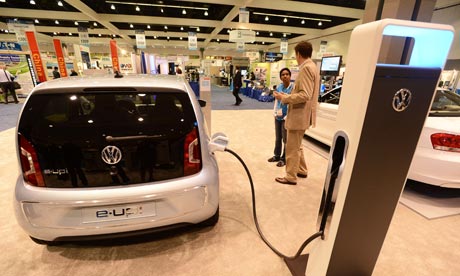
The drive to promote greener, more efficient motoring will blow a £13bn hole in the public finances as revenue from fuel and road taxes dries up, leading thinktanks have warned.
Tax breaks for electric cars and lower fuel consumption from efficient vehicles will mean a collapse in income even as road traffic increases, the Institute for Fiscal studies has found.
According to IFS research commissioned by the RAC Foundation and released on Tuesday, fuel duty collected by the exchequer will drop from 1.7% of GDP now to 1.1% of GDP by 2029, while vehicle excise duty will fall from 0.4% of GDP to 0.1% – a £13bn shortfall in revenue.
The implication, according to motoring groups, is that drivers may end up being taxed more, even as the industry adapts to meet environmental targets.
Prof Stephen Glaister, director of the RAC Foundation, said: "As drivers endure record prices at the pumps they might be surprised to learn that future governments face a drought in motoring tax income.
"The irony is that while ministers encourage us to buy greener, leaner cars, they are being forced to look at ways of clawing back the money motorists think they will be saving. This isn't scaremongering. The Treasury has already announced a review of VED bands to ensure drivers make a fair contribution to the public finances even as cars become more fuel efficient.
"If the chancellor was faced with a £13bn shortfall in motoring tax revenue today he would need to push the rate of fuel duty up from 58p per litre to 87p per litre to fill the financial black hole.
"The government has hard choices to make. Amongst the options are: forgoing the money it gets from drivers, pushing up duty on petrol and diesel, or starting to tax green forms of energy such as the electricity used in battery-powered cars.
"None are appealing. The first blows a hole in the Treasury's budget. The second blows a hole in drivers' budgets. And the third risks stalling the decarbonisation of road transport."
Paul Johnson, the director of the IFS, said the findings of its Fuel for Thought report suggested that road taxes based on mileage and congestion would work better than fuel duty.
He said there were two problems such a system would solve: "Petrol taxation does not reflect the fact that the costs I impose on others vary dramatically according to when and where I drive. So many drivers, in rural areas for example, are effectively overtaxed.
"But some, in congested urban areas, pay a lot less in tax than they would if they were paying for the costs they impose on other road users.
"And as cars become more fuel-efficient, the revenue from petrol tax will fall – eventually to close to nothing if we are to meet our climate change targets."
The Department for Transport last year predicted that road traffic will rise by 44% by 2035.

